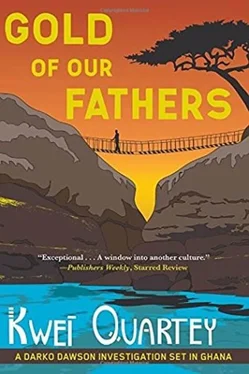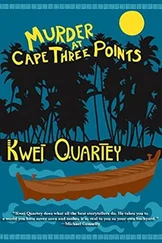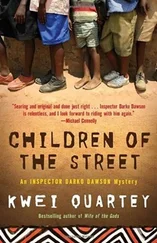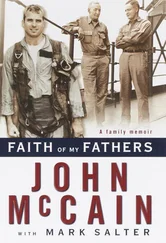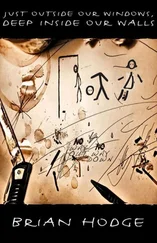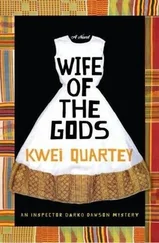Lian sent Huang and Dawson a querying look. Wei said something to her, obviously in explanation.
“Tell her I’m very sorry for the death of her husband,” Dawson told Huang after he had explained to her.
Huang did that, and then she asked Wei a question. He sat in the sofa closest to her chair and began what Dawson assumed was an account of everything that had happened that morning.
“She want know why take so long you inform her,” Huang said.
“Tell her I’m sorry for that,” Dawson said. “It was because we had to see to some police business first.”
She nodded in acceptance and asked something else.
“She want know if anyone caught,” Huang said, “and I told her no.”
“Thank you,” Dawson said. “Please ask her if she feels well enough for me to ask her some questions, or does she need some more time?”
Huang posed the question to her. “No, she okay, Mr. Dawson. You can go ’head.”
“Did Bao sleep here last night?”
“She says yes.”
“Excuse me for asking, but did she sleep in the same bed with him?”
“Yes.”
“What time did he leave to go to work this morning?”
After a short discussion, Huang came back to Dawson. “He told her last night that he go to help Wei fix excavator four o’clock in the morning, and so he have to wake up two thirty. She set her alarm clock and wake him up, and he leave about ten minutes.”
Kumasi to Dunkwa in under two hours , Dawson thought. Probably quite feasible that early, especially if Bao drove anything like his younger brother. “After she saw him for the last time,” Dawson asked quietly, aware that this might trigger tears again, “did she speak to him again?”
He was right. When Huang asked Lian, her chin began to quiver and her face cracked, shredded again by grief. She shook her head.
“No,” Huang said sadly. “She never speak to him again.”
“I’m sorry,” Dawson said. “I need to ask her something. Does she know of anyone who would want to kill Bao?”
A long discussion followed between the Lian and the Chinese males.
“She says she think Ghanaian galamsey men hate Bao, so maybe one of them do it.”
“Anyone in particular?” Dawson thought he had discerned a name in Lian’s long response. “She thinks Kudzo did it?”
Huang was astonished. “How you understand what she say?”
“I didn’t,” Dawson said. “I just heard the name Kudzo. Why does she think Kudzo did it?”
She shrugged in answer when Huang posed the question, and gave a sharp, short answer.
“She never trust them,” Huang explained, avoiding Dawson’s eye for some reason. “Always gave Bao trouble.”
“That isn’t all she said. Tell me all of it, Mr. Huang.”
He was squirming. “She say she hate this country,” he confessed. “She wish she never come here. She hate the black people, they lazy, all they want is money for no work. Thieves, make trouble all the time.”
“Ah, I see,” Dawson said.
“Sorry, sir,” Huang said.
Dawson shrugged. “At least she’s honest.”
“Lian wanna know where Bao body,” Huang said. “She want see him.”
“By now it should be at the mortuary at Komfo Anokye Teaching Hospital,” Dawson said. “If she feels prepared to go today, we can go there now.”
“She says she wants to.”
“Then let’s go,” Dawson said, “because today is Friday and there will only be a skeleton crew over the weekend.”
Mr. Huang’s SUV was much roomier than Wei’s pickup, so with Dawson in the front passenger seat and Huang and Lian in the back, Wei drove ten kilometers north to KATH. On the way there, the weekend spectacle for which the Ashanti Region, Kumasi especially, was infamous was on full display. Starting every Thursday-sometimes earlier-Kumasi was thronged with funerals and their preparation. A sea of people filled the streets wearing traditional funeral outfits of the deepest blacks and brilliant reds from scarlet to maroon.
The deceased might have been nobody while he was alive, but now that he was dead, he’d be famous. The shack he lived in that none of his children offered to fix up despite his pleas for assistance would now become a palace for the funeral. Rich or poor, the family would try to put on a show to wow the “mourners,” who might choose to attend based on how good the food promised to be, how expensive the alcoholic drinks would be, how many dance and drumming troupes would perform, and how fancy the coffin was. And the so-called mourners? How many yards of silky wax print fabric could you display, and what was the latest and most expensive in funeral fashion? How many gold bracelets could you fit on your wrists, how many rings on your fingers, and how much money could you contribute to the family bereavement fund for all to see?
Dawson turned away in some disgust, busying himself with his phone by texting Christine to ask how she was doing.
At the entrance, the KATH hospital sign, with the H in red, was perched on top of a kiosk of three ATMs, in case one forgot that cash would be needed for any kind of medical treatment. Cash is still king. The National Health Insurance Scheme was poorly funded, and services were not even close to free.
Mr. Huang found a parking spot and they walked the palm tree-lined path that skirted the parking lot and approached the newly painted white-and-bronze building. KATH had been around for a while and still had some of the old style louver windows. None of them knew where the mortuary was, but in Dawson’s experience, a morgue was always to the rear of the main hospital building. Having it in front wasn’t a particularly good omen.
Dawson asked directions from a passing nurse.
“That way,” she said, pointing.
They crossed through a large waiting area and down a steep incline. Dawson stole a glance at Lian to see how she was holding up. Her jaw was rigid.
Lining each side of the walkway were clusters of men and women-mostly women-in black and red. Most of these people were waiting for the release of a relative’s body. The buildings around which they loitered were old and worn, but at the bottom of the hill came something modern and spacious. Dawson opened the door for the other three and then followed them into a bright spotless lobby cooled to blissful temperatures. Offices lined the hallway in one direction, and down the other were an auditorium and a large comfortable waiting room. The mortuary was here ? It seemed almost too beautiful.
“May I help you?” a woman asked from behind a half window in the reception office to the left.
“Good afternoon,” Dawson said, moving closer. “Is the mortuary in this building?”
“No,” she replied. “This is administration. The morgue is around the corner to the left.”
Following her directions, Dawson and the others found the right place, and it conformed more to his general image of a mortuary. The inauspicious and unmarked entrance took them into a gloomy narrow hallway. A technician in khaki medical garb was walking down the corridor toward them. He knocked on a door and Dawson caught him just before he went in. The name on his breast pocket said nkrumah .
Dawson showed his ID.
Nkrumah, lanky with a bony face and shaved head, glanced at it. “Yes, please. How can I help you?”
“I’m working on the case of Bao Liu. Is the body here?”
Nkrumah sent a knowing glance at Dawson’s companions. “The Chinese man. Yes, he’s here. He just came. Please, one moment.”
He turned and went back down the corridor the way he had come, disappearing through swinging double doors on the far left. Dawson caught the first whiff of formaldehyde and corpses emanating from there. “Mr. Huang,” he said, turning to him. “You must warn Lian that Bao’s body will not be nice to look at. He will seem very different from when he was alive.”
Читать дальше
